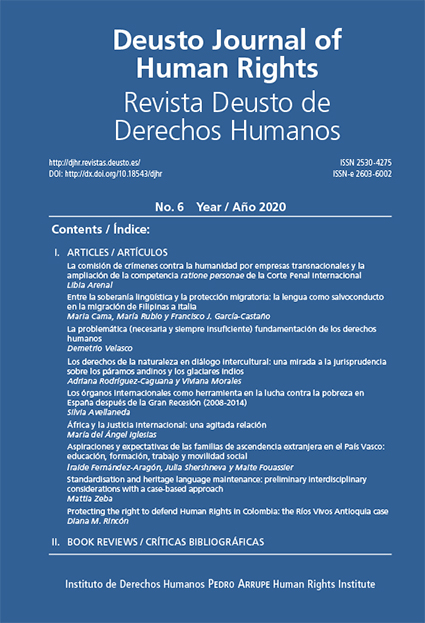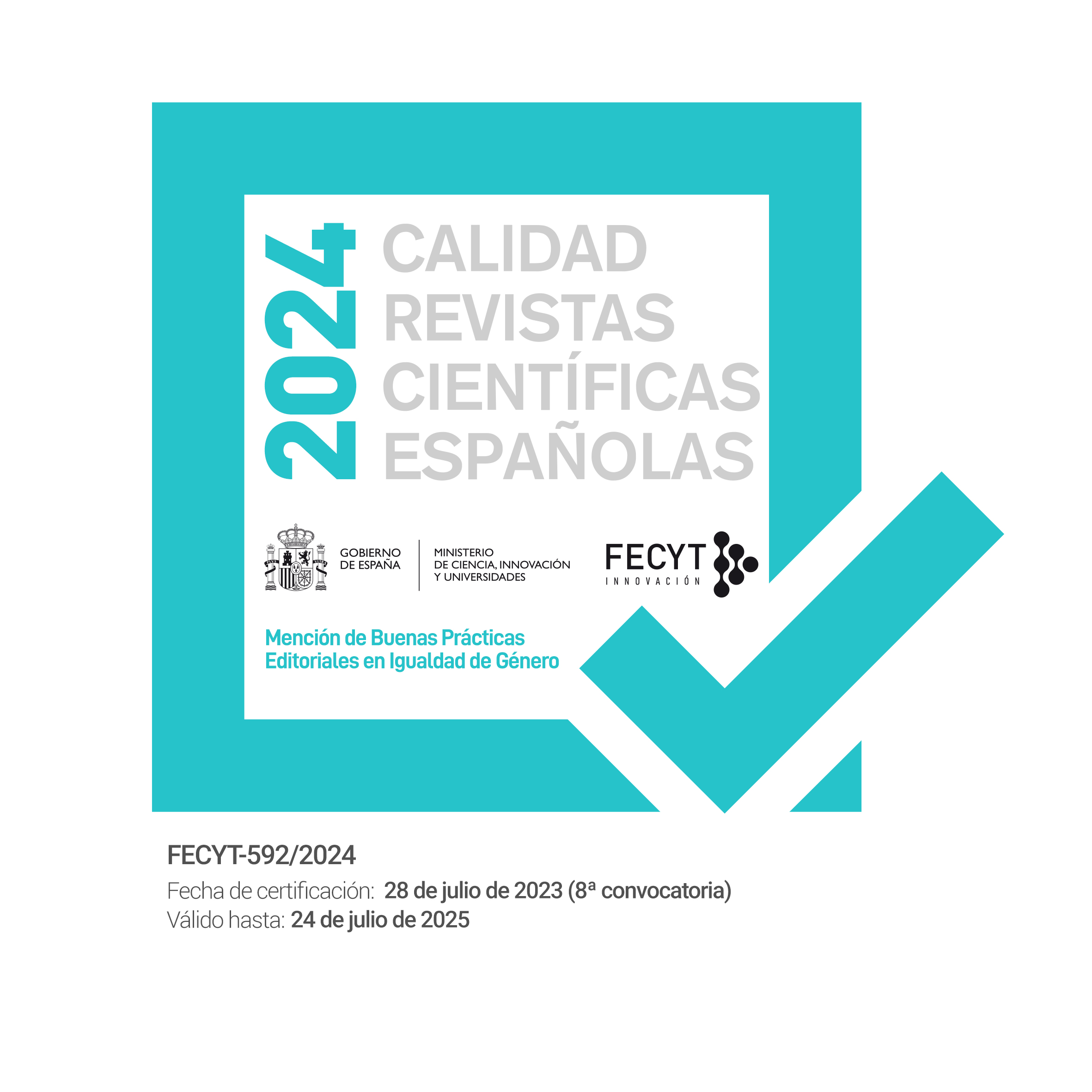Protecting the right to defend Human Rights in Colombia: the Ríos Vivos Antioquia case
Abstract
This paper focuses on the case of Ríos Vivos Antioquia, a social and environmental movement that fights against the construction of Hidroituango —the largest dam in Colombia— which has produced serious environmental and social impacts on the population surrounding the project. This article analyzes the internationalization of the struggle by this movement through different strategies aimed at defending the Human Rights of its community. For that purpose, this research uses documents produced by the movement and reports of some NGOs as well as interviews with members of RVAM and external collaborators to know their main strategies in some depth. This paper concludes that the strategies of internationalization used by this movement have resulted in the strengthening of the social struggle and the empowerment of the population in that region, which has been particularly affected by the violence in Colombia.
Recibido: 19 abril 2020
Aceptado: 06 noviembre 2020
Downloads
References
Amnesty International. 2020. Why do they want to kill us? Lack of safe space to defend human rights in Colombia. Accessed October 15, 2020 https://www.amnesty.org/en/documents/amr23/3009/2020/en/
Cavallaro James & Mohammad Mohamedou. 2005. «Public Enemy Number Two? Rising Crime and Human Rights Advocacy in Transitional Societies», Harvard Human Rights Journal 18: 139-165
Eguren, Luis E. 2017. Es tiempo ya: Políticas públicas eficaces para el derecho a defender los derechos humanos. Bruselas: Protection International and Cejil.
Escobar, Arturo. 1999. El final del salvaje: naturaleza, cultura y política en la antropología contemporánea. Bogotá: Cerec
Front Line Defenders. 2019. Global Analysis 2019. Accessed April 10, 2020. https://www.frontlinedefenders.org/sites/default/files/global_analysis_2019_web.pdf
Gómez, Alejandra. 2015. Conflictos socio-ambientales alrededor de la hidroeléctrica Hidroituango, tesis de pregrado en sociología. Medellín: Universidad de Antioquia. Inédita.
González, Adriana. 2006. «Acción colectiva en contextos de violencia prolongada». Estudios Políticos 29, 9-60.
Keck, Margaret E. & Kathryn Sikkink. 1998. Activists beyond Borders: Advocacy Networks in International Politics, New York: Cornell University Press.
Ministerio del Interior de Colombia. 2019. Plan de acción oportuna de prevención y protección para los defensores de derechos humanos, líderes sociales, comunales y periodistas. Accessed February 11, 2020. https://www.mininterior.gov.co/sites/default/files/plan_de_accion_oportuna_de_prevencion_y_proteccion_0.pdf
Nah Alice M., Karen Bennett, Danna Ingleton & Jamen Savage. 2013. «A research agenda for the protection of Human Rights Defenders», The International Journal of Human Rights 5: 401-420, https://doi.org/10.1093/jhuman/hut026
OHCHR. 2004. «Human Rights Defenders: Protecting the Right to Defend Human Rights», Fact Sheet 29 Accessed February 26, 2020 https://www.ohchr.org/Documents/Publications/FactSheet29en.pdf
OHCHR. 2018. End of mission statement by the United Nations Special Rapporteur on the situation of human rights defenders, Michel Forst on his visit to Colombia, 20 November to 3 December 2018. Accessed March 4, 2020. https://www.ohchr.org/EN/NewsEvents/Pages/DisplayNews.aspx?NewsID=23960&LangID=E
Ortúzar, Florencia, Astrid Puentes, Verónica Muriel & Marcela Ribeiro. 2018. Detrás de las represas: Inversiones del BNDES en Belo Monte e Hidroituango Aprendizajes hacia un financiamiento responsable. Accessed 05 March, 2020. https://aida-americas.org/sites/default/files/publication/Informe%20Espanol_3.pdf
Plana, Silvia. 2018. Informe Misión de observación de la situación de derechos humanos y de seguridad de las comunidades en los municipios de influencia del Proyecto Hidroeléctrico HidroItuango, Swefor en Colombia. Accessed February 15, 2020. https://riosvivoscolombia.org/wp-content/uploads/2019/03/Informe-Misi%C3%B3n-Antioquia.pdf
Pleyers Geoffrey. 2018. Movimientos sociales en el siglo xxi: perspectivas y herramientas analíticas, Buenos Aires: Clacso.
Redacción Política. 2020. «Al menos 555 líderes sociales han sido asesinados entre 2016 y 2019: Defensoría del Pueblo», El Espectador, January 14. Accessed February 25, 2020. https://www.elespectador.com/noticias/politica/al-menos555-lideres-sociales-han-sido-asesinados-entre-2016-y-2019-defensoria-delpueblo-articulo-89982
Somos Defensores Program. 2019. Annual report: A Clockwork Orange, Bogotá: Somos Defensores.
Tanaka, Martin & Francine Jácome. 2010. Desafíos de la gobernabilidad democrática. Reformas político-institucionales y movimientos sociales en la región Andina. Lima: INVESP.
Thoolen, Johannes. 2013. «Human Rights Awards for the Protection of Human Rights Defenders», Journal of Human Rights Practice 5: 548-555.
Torres, Astrid. 2019. Colombia Nunca Más: extractivismo-graves violaciones a los Derechos Humanos. Caso Hidroituango. 1990-2016, Medellín: Corporación Jurídica Libertad.
Ulloa Astrid & Sergio Coronado. 2016. Extractivismos y posconflicto en Colombia: retos para la paz territorial. Bogotá: Universidad Nacional de Colombia.
Wahyuni, Dina. 2012. «The research design maze: understanding paradigms, cases, methods and methodologies», Journal of Applied Management Accounting Research 10(1): 69-80.
World Commission on dams. 2000. Dams and Development: A New Framework for Decision-Making, 2000. Accessed February, 15, 2020 https://www.internationalrivers.org/sites/default/files/attachedfiles/world_commission_on_dams_final_report.pdf
Deusto Journal of Human Rights / Revista Deusto de Derechos Humanos is an Open Access journal; which means that it is free for full and immediate access, reading, search, download, distribution, and reuse in any medium only for non-commercial purposes and in accordance with any applicable copyright legislation, without prior permission from the copyright holder (University of Deusto) or the author; provided the original work and publication source are properly cited (Issue number, year, pages and DOI if applicable) and any changes to the original are clearly indicated. Any other use of its content in any medium or format, now known or developed in the future, requires prior written permission of the copyright holder.



3.jpg)
3.jpg)
3.jpg)
.jpg)








